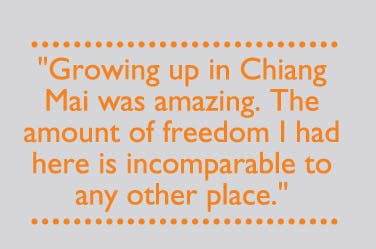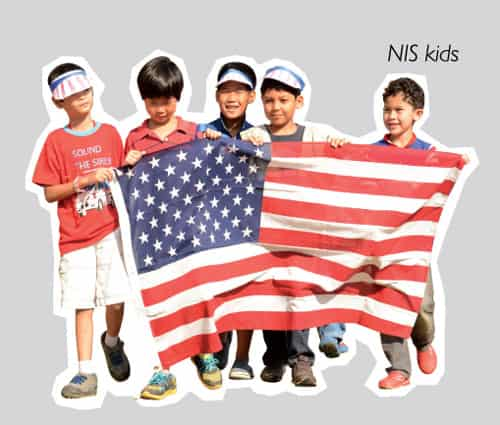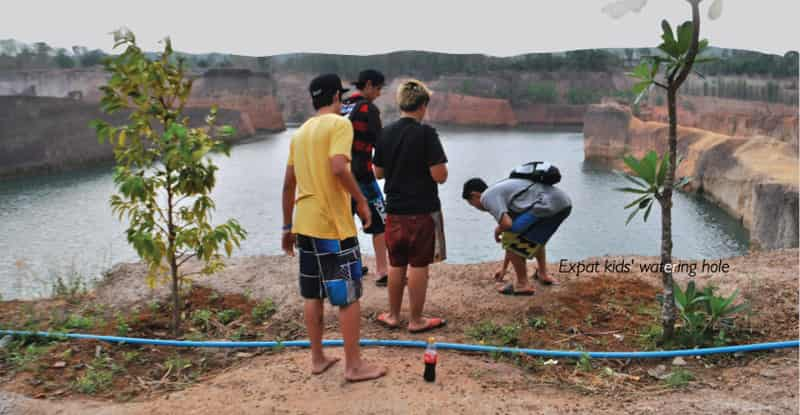Growing up abroad is often seen as a lucky experience reserved for the wealthy: going to expensive international schools, living in big houses and driving fancy cars. And it seems like there are few places better than Chiang Mai to grow up in, combining the tempting mix of rich Thai culture with the development of an increasingly cosmopolitan city. But what are the children of expats really thinking? To find out, I met a number of well-spoken and ambitious yet modest teens who are all well aware of the unique opportunities that have been presented to them. They contemplate their answers and choose their words carefully before opening up about their lives as expats’ children. Adolescence comes with highs and lows, and being part of the youngest subset of expats brings its very own set of benefits and challenges.
“Teens often just want to belong and fit in,” says Family Therapy and International Education counsellor Julia Simens, author of the book Emotional Resilience and the Expat Child. “This can be hard when they physically look so different from a Thai student their own age.” There are also cultural differences between Thai and expat children that can cause difficulties bonding with one another. “American girls love having sleepovers, but in Thailand it’s not common practice, so they must explore until a happy medium is found.”
Nicole Duhig has a combined 17 years of experience as a Career and College Counsellor in her home country of England as well as in Cyprus, and is now working at Prem Tinsulanonda International School for her second year. She has witnessed firsthand the difference between the students who grew up in their birthplace and students who grew up abroad. “Children growing up overseas come in contact with so many different cultures that they no longer have the stereotypical images that kids at home might have,” she says. “You might think your country has a certain reputation abroad but you quickly learn that you’re not put in a box. It’s a valuable experience learning to get along with other nationalities and people with different backgrounds.”
Simens agrees with Duhig and points out, “Children studying abroad learn in non-academic ways too. Travel increases their global awareness.” Simens believes that there are three groups of personal attributes that expat children develop more than homegrown children: Qualities and Values, Friendship Skills, and Self-Esteem and Learning. “They often have a worldview on issues as well as being more exposed to other cultures which make them more compassionate and understanding (qualities and values). They also need to reach out and connect when they move to a new place so they tend to be braver in social situations (friendship skills). Lastly, after they have successfully mastered a move, they can often bring that sort of risk-tasking into the classroom and not be afraid to take risks and try something new (self-esteem and learning),” she says.

Moving Away
One of the most difficult changes students go through is leaving the country in which they were born or spent their formative years. Daily routines and accustomed lifestyles get turned upside down, friends and family left behind, and children are dropped into a whole new culture with inevitable preconceived notions.
“Letting go of the stereotypes, embracing ‘what is’ and getting on with real life will be key in a successful transition,” says Simens. But having lived in Thailand for four years herself, she knows this is often easier said than done.
It was with hesitance that Cristina Nearing (18) reacted when she heard she was moving to PTIS in Chiang Mai after six years in the Philippines. The surroundings were unfamiliar and the differences overwhelming. “I went to a very small, private Catholic school and when I moved here I felt anxious because I was going to an enormous international school with people from all over the world,” she recalls. “In the Philippines I went to church with my fellow students but that stopped abruptly once I came here and some students would even mock the Bible, which shocked me in the beginning.”
Jasper Benchara (16) on the other hand was glad to hear he was swapping Venice for Chiang Mai: “I was bullied in my middle school in Italy. The fact that it was an elite international school made it worse because everyone was trying to prove themselves and be better than the other.” After eight years in Italy, his parents moved to Chiang Mai for the second time. “I was really happy because I had spent several months here earlier and made good friends so I knew what to expect,” he says.
Leaving his parent’s home country of Germany at the mere age of three, Julian Kossmann (17) has few childhood memories of his time there but still visits every summer. “Growing up in Chiang Mai was amazing. The amount of freedom I had here is incomparable to any other place. Here it’s largely free of regulations, which is a huge difference with Germany, where I feel like everything is organised to the smallest detail and carefully planned out on a piece of paper,” he says. “I once went to the cinema past a certain hour in Germany and promptly got kicked out. I thought to myself: that would never be a problem in Thailand. The moment I got home, I downloaded all the rules and regulations regarding minors and learnt them by heart!”
Fitting In
Changing schools is never easy, and expat children not only have to adapt to a new school but simultaneously acclimate to a new way (and pace) of life. This can be particularly difficult for teenagers, going through a period of self-discovery in which environment plays a huge part in self-development. “When I first arrived at my new school, I was faced with the dilemma whether I should hang out with the Thai or the English-speaking kids,” says Thai-American Ploy Cook (14). “I soon got to know both sides, but growing up in the States I grew up with another mentality.” One of the big cultural differences was sense of humour. “I can be very sarcastic at times and Thai kids don’t always get it,” she adds.
One reoccurring obstacle many foreign students face is the language barrier. Some students who arrive at English-speaking international schools have trouble finding their words and ways to express themselves when they were raised in another language.
Yvonne Strauss (16) also encountered language problems, but with a twist. “The past few years I’ve been living in a German-speaking dorm in Chiang Mai where we’ve created our own expressions in German. People who hear us talking tell us that they wouldn’t understand us in Germany,” she giggles. Julian Kossmann agrees. “I speak English now better than German, which is frightening because I’m going to a German university. I try to keep up with the national news on the internet and sometimes I discover expressions in German that I had never heard of before.”
One of the biggest challenges faced by expat children is always having to say goodbye. It is something they have to get used to…but that doesn’t make it any easier. Ralph van den Berg (30), born in France to Dutch parents, attended a local Thai school when he first arrived here at age nine, before graduating from Chiang Mai International School. Although he had little trouble fitting in, the real problem for him was making friends that he saw a future with. “After years of seeing kids come and go I had become frustrated trying to make new friends. I had lost many good friends who moved away after living here three or four years,” he says. And yet, after graduating from Payap University, he decided to stay in Chiang Mai. “I grew up here, so I never really considered moving back to the Netherlands,” he admits. “People who move somewhere else do so because they have something better waiting for them or they’re trying to get away from something. I’m happy here, so why leave, right?”

Indeed, even for those staying here for a short period, Chiang Mai has a tendency to feel like home, which makes it difficult to leave. Two years ago, Char-Christ Anzai (17) was close to leaving Thailand and moving to the States permanently. “We actually spent several months there but I didn’t feel comfortable living there and I didn’t like my school. Chiang Mai and Lanna International School pulled me back,” he says. “We often get students who return after two or three years and we even have teachers that were former students here.”
Julia Simens believes that the way young people leave one country will influence how they enter a new location. “If you continue to feel like you missed out on something because you weren’t living in your home country or you felt that you wanted to leave the country quickly and say good riddance, then your next country will also seem shallow and unimportant,” she says. According to Simens, family is the cornerstone to ensure teenagers feel comfortable with the changes. “Teenagers need family values, traditions and rules that are consistent in all locations. This will help them feel more grounded and secure.”

Missing Home
Homesickness is another challenge many expat children face in their move abroad. Feeling safe, having a sense of security in friendships and knowing your environment well are all associated with home. “One psychological issue everyone faces is the need to belong. We have a need to connect to feel happy and fulfilled,” explains Simens. Parents can play an important role in their children’s lives to smooth the transition, she adds. “To ensure social and emotional stability it is important to blend the past with the present. You have to connect your new location with your past locations or home. Attachment and vital close connections are key to a person’s happiness.”
Thailand, which is usually lauded for its laid-back culture, can at times be frustrating for children (or really anyone) in need of structure. “At times, the chaos here can be mind-numbing and makes me miss the degree of organisation in Germany,” says Julian Kossmann. “When I get off the plane there, everything seems to have its place, its correctness.”
Words of Advice
A common piece of advice among the international school students is to be open and seize every opportunity you receive with both hands. Nicole Duhig agrees and stresses the importance in the growing global economy of a broad knowledge of the world, in addition to being fluent in several languages. “These are two assets that students studying abroad develop just by going to their schools and interacting with other students. They pick up different languages because their friend groups often consist of so many different nationalities.”
The expat children are full of good advice for their fellows. Julian Kossmann believes that taking risks is the only way you can really acclimate to a new culture. “Expose yourself to new things actively, don’t lock yourselves in,” he says. “Take the risk of meeting new people because they often are really interesting and have valuable life experiences. Feel inclined to open up to the rest of the city and don’t miss out on the world of opportunities and culture.” Adds Ploy Cook: “Don’t assume that everything’s the same as back home. Start with a new mind and perspective on things and don’t compare Thailand to the country you once lived in.”

